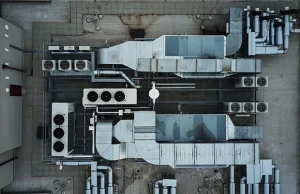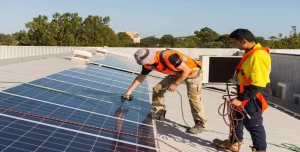Improving HVAC system efficiency is crucial for minimizing energy bills and maximizing comfort in both residential and commercial buildings. Recent studies have shown that HVAC systems account for a significant portion of energy consumption, making it essential to implement strategies that enhance their performance.
By incorporating regular maintenance, optimizing thermostat settings, and utilizing insulation and sealing techniques, individuals can effectively boost the efficiency of their HVAC systems.
Regular maintenance is key to ensuring that HVAC systems operate at peak efficiency. This includes tasks such as cleaning or replacing air filters, inspecting and cleaning ductwork, and checking for any leaks or obstructions. By keeping the system clean and well-maintained, it can function optimally and consume less energy.
Optimizing thermostat settings is another effective strategy for improving HVAC efficiency. Setting the thermostat to appropriate temperatures based on occupancy and time of day can help prevent unnecessary energy consumption. Programmable thermostats are particularly beneficial as they allow users to schedule temperature adjustments according to their specific needs and preferences.
Insulation and sealing techniques play a significant role in maintaining comfortable indoor temperatures while minimizing energy waste. Proper insulation helps prevent heat transfer, keeping the desired temperature inside the building. Additionally, sealing air leaks in windows, doors, and ductwork prevents conditioned air from escaping, decreasing the workload on the HVAC system.
Furthermore, upgrading to a more efficient HVAC system can be a smart investment in long-term energy savings. Newer models often incorporate advanced technologies that improve energy efficiency and offer better performance. These systems are designed to use less energy while providing the same level of comfort, resulting in reduced energy bills.
In conclusion, implementing these top strategies for boosting HVAC efficiency is essential for minimizing energy consumption and maximizing comfort. Regular maintenance, optimizing thermostat settings, and utilizing insulation and sealing techniques can significantly improve the performance of HVAC systems. Additionally, considering an upgrade to a more efficient HVAC system can lead to long-term energy savings. By taking these steps, individuals can enhance their HVAC system’s efficiency while reducing their environmental impact.
5 Essential Tips for Improving HVAC System Efficiency
Improving HVAC system efficiency requires implementing essential tips that address various factors affecting the overall performance.
To reduce energy consumption in HVAC systems, several measures can be taken.
First, regular maintenance is crucial to ensure optimal functioning. Cleaning or replacing air filters regularly improves airflow and prevents the system from working harder than necessary.
Additionally, sealing ductwork helps eliminate leaks that can result in significant energy loss. Proper insulation of walls, ceilings, and floors minimizes heat transfer and reduces the workload on the HVAC system.
Furthermore, programmable thermostats allow for precise temperature control and enable users to set different temperatures for specific times of the day.
Finally, upgrading to energy-efficient equipment such as high-efficiency air conditioners or heat pumps can significantly reduce energy consumption while maintaining comfort levels.
The Importance of Regular HVAC Maintenance for Efficiency
Regular HVAC maintenance is crucial for optimizing the efficiency of the system. By conducting regular maintenance, homeowners can ensure that their HVAC systems are running at peak performance, resulting in improved energy efficiency and lower utility bills.
Professional HVAC tune ups offer several benefits in this regard. Firstly, they involve a comprehensive inspection of the entire system to identify any issues or potential problems that may be hindering its efficiency. This allows for timely repairs or adjustments to be made, preventing further damage and minimizing energy waste.
Additionally, professional technicians have the expertise to clean and lubricate various components of the system, ensuring smooth operation and reducing friction-related energy losses.
Overall, regular HVAC maintenance not only improves efficiency but also extends the lifespan of the system, ultimately saving homeowners money in the long run while maximizing comfort levels throughout their homes.
How to Optimize Your Thermostat Settings for Energy Savings
Optimizing thermostat settings can greatly contribute to energy savings in residential settings. By setting the temperature at the optimal level, homeowners can effectively manage their HVAC systems and reduce energy consumption.
Programmable thermostats offer advanced features that allow for more precise control over temperature settings throughout the day. These thermostats enable users to create schedules based on occupancy patterns and personal preferences, ensuring that heating or cooling is only used when needed. Additionally, programmable thermostats often include energy-saving modes and intelligent algorithms that adapt to occupants’ behaviors, further enhancing efficiency.
It is recommended to set the thermostat a few degrees lower during winter months and a few degrees higher during summer months when residents are away from home or sleeping. This strategy helps minimize energy usage while maintaining comfort levels within an acceptable range.
Insulation and Sealing: Key Steps for HVAC Efficiency
Insulation and sealing play a crucial role in enhancing the overall efficiency of HVAC systems.
Improving insulation helps to minimize heat loss or gain from the surrounding environment, ensuring that conditioned air remains at the desired temperature for longer periods. This reduces the workload on HVAC equipment, leading to lower energy consumption and increased system efficiency.
Maximizing sealing involves sealing any gaps or leaks in ductwork, windows, doors, and other areas where air can escape or enter a building. By preventing air leakage, HVAC systems can maintain optimal indoor temperatures more effectively, resulting in improved energy efficiency.
Implementing these cost-effective measures not only enhances comfort but also minimizes energy bills by reducing the need for constant heating or cooling adjustments.
Therefore, investing in insulation and maximizing sealing are essential steps to improve HVAC system efficiency.
Upgrading Your HVAC System: A Smart Investment for Efficiency
Upgrading an HVAC system can offer significant benefits in terms of energy efficiency and overall performance. Investing in a high-efficiency HVAC system is a cost-effective investment that can lead to substantial long-term savings on energy bills.
Energy efficient HVAC systems utilize advanced technologies, such as variable speed motors and smart thermostats, to optimize heating and cooling operations based on real-time demand. These systems are designed to deliver precise temperature control and minimize energy wastage by adjusting output levels according to the specific needs of the space being conditioned.
Additionally, energy efficient HVAC systems often come with improved air filtration capabilities, resulting in better indoor air quality and enhanced comfort for occupants.
With reduced energy consumption, lower utility bills, improved comfort levels, and healthier indoor environments, upgrading your HVAC system is a wise decision that pays off both economically and environmentally.
Conclusion
Maximizing comfort and minimizing bills can be achieved by implementing top strategies to boost HVAC efficiency.
Regular maintenance is crucial for keeping the system running smoothly and efficiently.
Optimizing thermostat settings can lead to significant energy savings.
Insulation and sealing play a vital role in preventing heat loss or gain, ensuring optimal HVAC performance.
Lastly, upgrading your HVAC system can be a smart investment that enhances overall efficiency.
By following these essential tips, you can improve your HVAC system’s efficiency and enjoy greater comfort while reducing energy costs.
You May Also Like:


